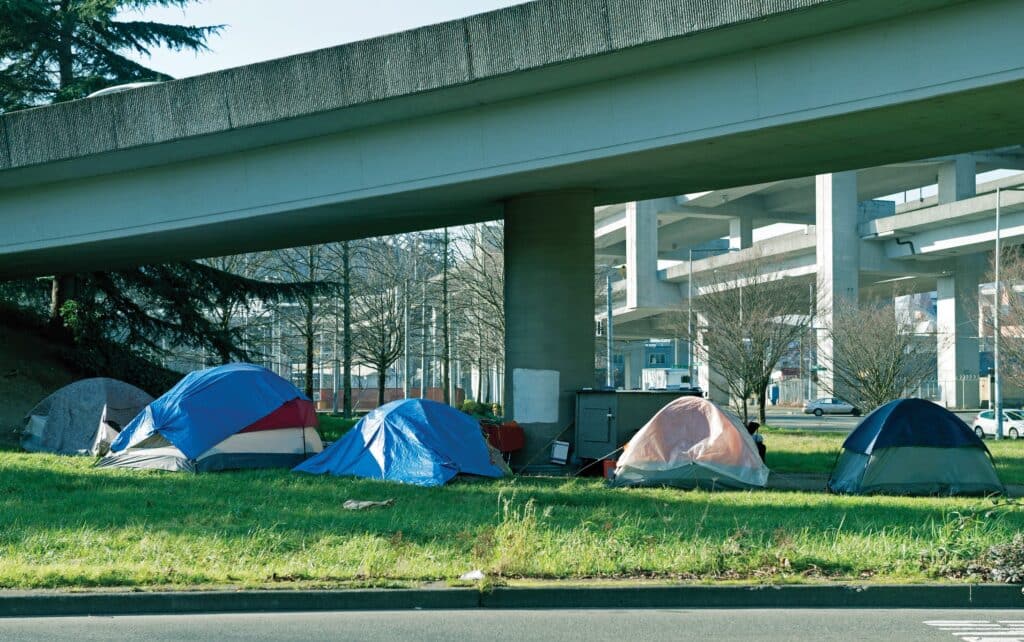How the Supreme Court Could Impact Homelessness
By Steve Berg
4 min read
The Supreme Court recently heard arguments in City of Grants Pass, Oregon v. Johnson, in a rare instance of the Court grappling with the issue of homelessness. This is the most significant Supreme Court case about homelessness in decades. The immediate outcome is uncertain, but it will almost certainly impact how people think about homelessness – and how communities respond.

About the Case
Grants Pass, Oregon v. Johnson is a court case that was originally filed in 2018 following a ruling by the U.S. Court of Appeals for the Ninth Circuit, which determined that the imposition of criminal penalties for sitting or sleeping outside by people experiencing homelessness who do not have access to shelter is cruel and unusual punishment. Following the decision, John Logan, Gloria Johnson and Deborah Blake went to federal court in Oregon to challenge the ordinances in place in Grants Pass. The city asked the Supreme Court to weigh in after a federal district court issued a permanent injunction that barred the City of Grants Pass from enforcing its ordinances.
Grants Pass, OR—like many cities in this country—is thousands of housing units short of what is needed and is unable to offer enough shelter beds. Despite this shortfall, the city would prefer to punish people for sleeping in public rather than invest in proven solutions. Should the ruling be overturned by the Supreme Court, it would set a precedent that would empower local officials to rely on carceral approaches to homelessness, rather than fulfill their duty to address the community’s clear needs for housing, shelter and supportive services.
Not only do these measures (tickets, fines, etc.) make it harder for people to get a roof over their heads after they’ve been homeless, it costs taxpayers more to fund these punitive approaches, as opposed to providing them with housing and services instead. Further, they are ineffective – a recent study by SSRN found that punitive ordinances do not result in a reduction in people experiencing homelessness.
The results of this Supreme Court case could vary: from confirmation of positive approaches to ending homelessness, to a ruling that would make homelessness harder to escape by imposing arrest records and exacerbating conflicts instead of adopting evidence-based solutions that work. These include long-term investments in safe and affordable housing and wraparound services, combined with short-term strategies, like street outreach, behavioral and health services, and housing-focused shelters, that keep people as safe and healthy as possible. Hopefully, the Court will rule on the side of organizations across the country that have been working tirelessly to implement these strategies while the number of people entering homelessness for the first time is at an all-time high.
National-Level Work
The National Alliance to End Homelessness joined Funders Together to End Homelessness and Enterprise Community Partners to submit a “friend of the court” brief, clarifying the right approaches to resolve homelessness.
This brief, from three organizations that have expended substantial energy making resources available to solve this problem, summarizes the basic constitutional argument in favor of affirming the lower court’s decision against the criminalization practices of Grants Pass. It describes the work communities around the country have done to improve homelessness, using approaches that focus on getting people quickly into housing and providing the services they need to stay stably housed. It describes the research that backs up that approach. And finishes with research showing that criminalization is ineffective in reducing homelessness.
The data is clear: criminalizing homelessness is expensive and does little to solve the issue. Providing supportive housing and services is a cost-effective strategy for the taxpaying public and actually reduces homelessness.
The claims by Petitioner and Amici that the Ninth Circuit’s decision below keeps them from meaningfully addressing homelessness ignore that criminalization does not, in fact, work while housing and services programs do. For the reasons stated above and in Respondents’ brief, the Court should uphold the Ninth Circuit’s decision in Grants Pass.

What Comes Next
Advocates held rallies across the country—including in front of the Supreme Court in Washington, DC—on April 22, the day of the oral arguments.
National partners will continue this work once the Court issues a decision: to both encourage and help communities adopt effective practices and approaches, and help enact federal and state policies that fund, support and incentivize those approaches and practices.
Whatever the Court decides, it seems certain that communities around the country will be reexamining their approaches due to increasing homelessness nationwide. The National Alliance to End Homelessness will do everything in its power to ensure that people understand what it takes to have a real positive impact on the problem, to help communities implement those solutions and to help policymakers support this work.
This article was previously published by the National Alliance to End Homelessness on April 16, 2024.
